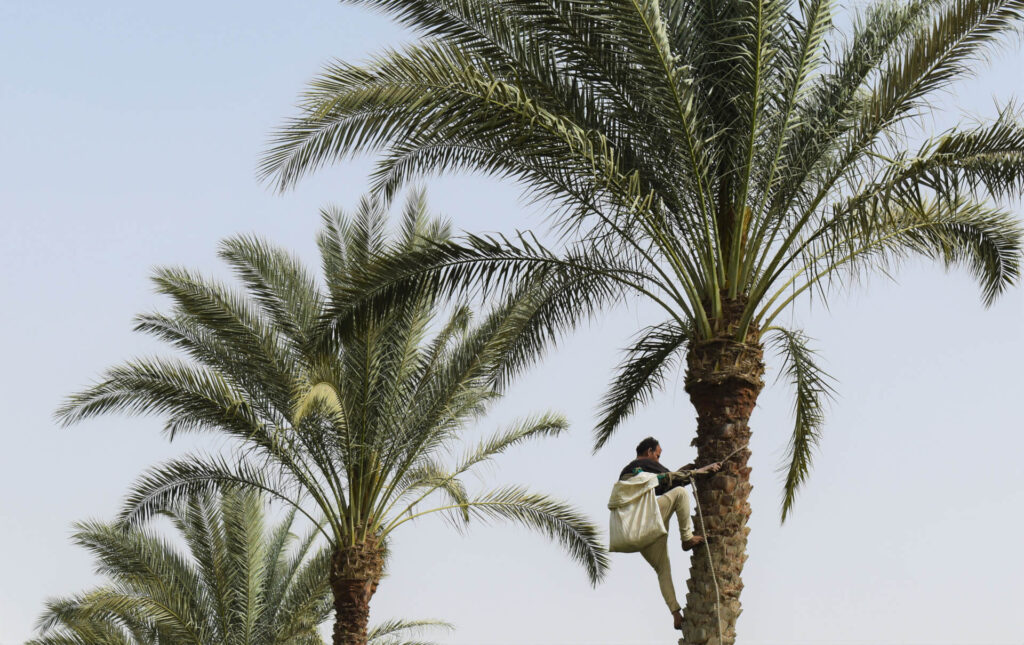climate Smart crops
Key impact in 2020
ICARDA plays a critical role in developing and disseminating climate-resilient, market-driven crop varieties that provide a crucial defense against extreme temperatures, water scarcity, the emergence of new pests and diseases, and nutritional insecurity in dry regions.
Our improved cereal and legume varieties have been tested and released over the past four decades by national partners across the Central and West Asia and North Africa (CWANA) region, South Asia, and sub-Saharan Africa, and beyond. Our new varieties have been adopted by farmers worldwide, generating net benefits of approximately US$850 million annually.
ICARDA’s improved crops combat a range of challenges typical in dry regions. They can flourish in areas where rainfall is low and erratic, offer greater and more stable yields, and have a higher tolerance to stress factors such as diseases, pests, drought, and extreme temperatures. Many varieties are also biofortified with micronutrients, especially iron and zinc, offering better nutritional quality.
ICARDA Climate-Smart Crops and One CGIAR
ICARDA’s Breeding, Seed Systems, and Genetic Resources teams now work alongside other CGIAR centers to develop the One CGIAR Initiatives that seek to unify efforts in crop improvement globally and across CWANA. The goals of the unified approach are improved crops and breeding methods, knowledge sharing, pooling of genetic resources, and creating excellence in breeding standards.
To find out about our 2020 work in Climate Smart Crops, click below:
ICARDA improves the productivity and yield stability of pulses by aiming to make sure responses to biotic and abiotic stress factors are effectively controlled and inherent yield potential is improved…
The DIIVA-PR Project
The ICARDA “Dissemination of Interspecific ICARDA Varieties via Participatory Research” (DIIVA-PR) project, is supported by the Crop Trust Crop Wild Relatives (CWR) Project. The project develops new climate smart crop varieties derived from CWR crosses, and through a participatory varietal selection strategy, introduces them to farmers in dry regions critically affected by climate change and climate variability.
Collected data from fifteen environments guide the precise identification of traits and best performing germplasm, and some 500 CWR-derived elite lines have been generated for durum wheat, barley, and lentil crops. Twenty-eight on-farm trials were conducted, and despite the severe drought that affected Morocco in 2020, farmers growing DIIVA elites for the second season reported good performances. This process resulted in the registration of two varieties in Lebanon, one in Senegal, and the expected registration in 2021 of one variety also in Morocco.

ICARDA also works across the Arabian Peninsula to improve date palm, an important crop for the region where 90 percent of global date production is concentrated. Funded by the Secretariat General of the Gulf Cooperation Council (GCC), the project improves date palm production systems in GCC countries, employing modern technology to increase crop management, post-harvest seed operation, and market and value chain development. Major project milestones in 2020 include applying drone technology to monitor pests, applying new liquid pollination techniques, and post-harvesting monitoring and control. Liquid pollination resulted in cost reductions of 80%, savings of 70% in pollen grains, and a profitability ratio of 1:9 when compared to conventional methods.

ICARDA International Nurseries
ICARDA’s International Nurseries (IN) team implemented seed production and distribution for 1,295 sets of 28 IN trials, covering 1,566 genotypes spread over the seven ICADDA crops, to 114 cooperators in 43 countries. From ICARDA-generated germplasm under development, distributed to national counterparts through the IN system, we released two barley and fourteen wheat varieties for crop production in four countries.
We also distributed three tons of quality seed of ICARDA-originated varieties of its six mandated crops to Syria and Lebanon for further multiplication and distribution. And we produced 160 kg of seed from 200 genotypes, selected from 1,300 accessions of dryland forages, for distribution to livestock-based livelihood communities in Lebanon, accompanied by a training video. The
| Crops | Afghanistan | Ethiopia | Lebanon | Turkey | Grand Total |
|---|---|---|---|---|---|
| Barley | 0 | 0 | 0 | 2 | 2 |
| Bread Wheat | 3 | 1 | 0 | 0 | 4 |
| Durum Wheat | 0 | 0 | 2 | 0 | 2 |
| Winter Wheat | 0 | 0 | 0 | 8 | 8 |
| Grand Total | 3 | 1 | 2 | 10 | 16 |
New elite lines of our crops aligned to market-oriented product profiles can be found in ICARDA’s International Nurseries.
ICARDA’s International Nurseries Team implemented seed production and distribution for 1,295 sets of 28 International Nursery trials, covering 1,566 genotypes spread over the 7 ICARDA crops, to 114 cooperators in 43 countries.
We also distributed three tons of quality seed of ICARDA- originated varieties of its six mandated crops to Syria and Lebanon for further multiplication and distribution. And we produced 160 kg of seed from 200 genotypes, selected from 1,300 accessions of dryland forages, for distribution to livestock-based livelihood communities in Lebanon, accompanied by a training video.
